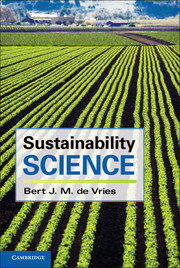Book contents
- Frontmatter
- Contents
- Preface
- 1 Introduction
- 2 The System Dynamics Perspective
- 3 In Search of Sustainability: Past Civilisations
- 4 The World in the Past 300 Years: The Great Acceleration
- 5 Sustainability: Concerns, Definitions, Indicators
- 6 Quality of Life: On Values, Knowledge and Worldviews
- 7 Energy Fundamentals
- 8 On Knowledge and Models
- 9 Land and Nature
- 10 Human Populations and Human Behaviour
- 11 Agro-Food Systems
- 12 Renewable Resources: Water, Fish and Forest
- 13 Non-Renewable Resources: The Industrial Economy
- 14 Towards a Sustainable Economy?
- 15 Outlook on Futures
- Glossary
- References
- Index
- Plate Section
- References
14 - Towards a Sustainable Economy?
Published online by Cambridge University Press: 05 January 2013
- Frontmatter
- Contents
- Preface
- 1 Introduction
- 2 The System Dynamics Perspective
- 3 In Search of Sustainability: Past Civilisations
- 4 The World in the Past 300 Years: The Great Acceleration
- 5 Sustainability: Concerns, Definitions, Indicators
- 6 Quality of Life: On Values, Knowledge and Worldviews
- 7 Energy Fundamentals
- 8 On Knowledge and Models
- 9 Land and Nature
- 10 Human Populations and Human Behaviour
- 11 Agro-Food Systems
- 12 Renewable Resources: Water, Fish and Forest
- 13 Non-Renewable Resources: The Industrial Economy
- 14 Towards a Sustainable Economy?
- 15 Outlook on Futures
- Glossary
- References
- Index
- Plate Section
- References
Summary
An Archetypical Model
The industrialisation process, and the transition to a next regime, which is in full swing but still not easily recognised and interpreted, consists of several changes in succession (§8.6). I consider the postindustrial transition process a change from low income and low resource use levels towards a new equilibrium at high- and stable income and resource use levels. In stylised form, it can be summarised in seven items:
a positive feedback process drives the growth of income (€/cap/yr), which leads to (exponential) growth in activity chains;
the chains consist of exploration and extraction of resources, followed by processing into manufactured goods, use and discarding;
fossil fuels are an essential high-quality energy resource, that enables in combination with capital and knowledge accumulation a steady increase in labour productivity;
the resource intensity of income (mass/€) first rises and then declines with income (IU hypothesis);
the externalities along the chain: resource depletion, pollution impacts and waste accumulation, are initially not perceived and not priced;
with a delay, externalities are incorporated in the resource price in response to complaints of the more affluent citizens (EKC hypothesis);
the rising resource price stimulates a process of cost- and pollution-reducing innovations and the development of substitutes and alternatives.
The affluent countries are in the later stages of the transition; in the low-income countries, the first stages can be identified although the details depend on local circumstances and there may be jumps (‘leapfrogging’). The possibilities to import resources from abroad, the vulnerability of the natural environment and the worldviews and behaviour of people are important determinants of how the transition will unfold. In this chapter, I focus on the techno-economic aspects.
- Type
- Chapter
- Information
- Sustainability Science , pp. 472 - 515Publisher: Cambridge University PressPrint publication year: 2012



